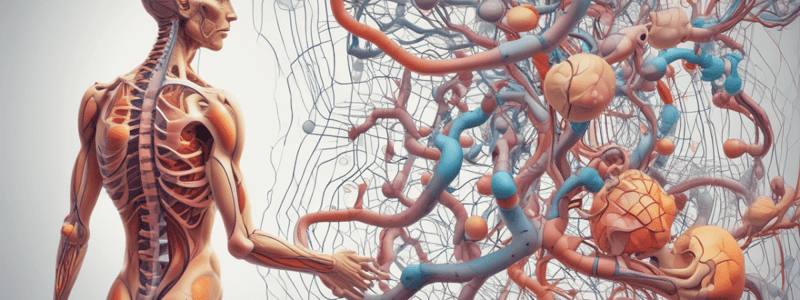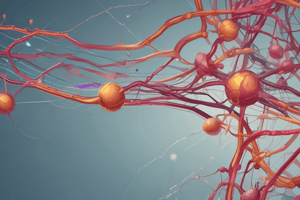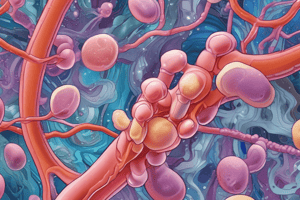Podcast
Questions and Answers
What is the primary function of albumin in maintaining normal plasma levels of certain substances?
What is the primary function of albumin in maintaining normal plasma levels of certain substances?
- Binding and transporting molecules with positive charge, drugs, and unesterified fatty acids (correct)
- Regulating osmotic pressure in the interstitial space
- Acting as an anti-inflammatory agent
- Maintaining plasma oncotic pressure
What is the pH range in which albumin's imidazole groups are completely ionized and can accept four hydrogen ions?
What is the pH range in which albumin's imidazole groups are completely ionized and can accept four hydrogen ions?
- pH 6-10
- pH 7-8
- pH 5-6.5 (correct)
- pH 4-5
What is the role of albumin in regulating the osmotic pressure in the interstitial space?
What is the role of albumin in regulating the osmotic pressure in the interstitial space?
- It has no role in regulating osmotic pressure
- It is the main macromolecule responsible for regulating osmotic pressure
- It only regulates osmotic pressure in the blood plasma
- It works in conjunction with hyaluronic acid to regulate osmotic pressure (correct)
What is a common indication for the therapeutic administration of albumin?
What is a common indication for the therapeutic administration of albumin?
What is the percentage of plasma oncotic pressure contributed by serum albumin?
What is the percentage of plasma oncotic pressure contributed by serum albumin?
What is a consequence of hypoalbuminemia?
What is a consequence of hypoalbuminemia?
What is an additional function of circulating albumin beyond its role in maintaining plasma oncotic pressure?
What is an additional function of circulating albumin beyond its role in maintaining plasma oncotic pressure?
What is the role of albumin in the interstitial space?
What is the role of albumin in the interstitial space?
What is the primary function of albumin during inflammation?
What is the primary function of albumin during inflammation?
What percentage of albumin produced daily is immediately metabolized in hepatocytes?
What percentage of albumin produced daily is immediately metabolized in hepatocytes?
What is the approximate half-life of human serum albumin?
What is the approximate half-life of human serum albumin?
What is the consequence of lower than normal albumin levels on plasma volume availability?
What is the consequence of lower than normal albumin levels on plasma volume availability?
What is the role of albumin in the transportation of substances?
What is the role of albumin in the transportation of substances?
What is the impact of lower serum albumin levels on the activity of the renin-angiotensin-aldosterone system?
What is the impact of lower serum albumin levels on the activity of the renin-angiotensin-aldosterone system?
What is the consequence of albumin-pregnant fluids collecting in the tissues?
What is the consequence of albumin-pregnant fluids collecting in the tissues?
What is the effect of inflammation on albumin levels?
What is the effect of inflammation on albumin levels?
What is the role of albumin in modulating biochemical reactions?
What is the role of albumin in modulating biochemical reactions?
What is the outcome of full recovery of the proper serum albumin value in chronic diseases?
What is the outcome of full recovery of the proper serum albumin value in chronic diseases?
Flashcards are hidden until you start studying
Study Notes
Physiological Role of Human Albumin
- Albumin, due to its high negative electrical charge, binds and transports molecules with positive charge, drugs, and unesterified fatty acids, maintaining normal plasma levels of these substances.
- Albumin participates in chemical buffering of blood plasma, accepting four hydrogen ions between pH 6.5 and 5, and serving as a "shuttle" that minimizes changes in hydrogen ion concentration.
Functions of Human Albumin
- Albumin exhibits anti-inflammatory and immunomodulatory activities, scavenging enzymes and substances secreted by immune cells during inflammation.
- Albumin is involved in regulating osmotic pressure in the interstitial space, although to a lesser extent than hyaluronic acid.
- Albumin maintains oncotic pressure, serves as a diluent for other drugs, bilirubin, and nutrients, and acts as a free radical scavenger, depot, and transporter for metal ions, hormones, therapeutic drugs, and other biologically heterogeneous molecules.
- Albumin mediates ligand-receptor interactions and binding mechanics.
Impact of Albumin Levels on Clinical Outcomes
- Hypoalbuminemia can occur in the presence of hepatic-related diseases.
- Lower albumin levels reduce plasma volume availability, leading to fluid accumulation in tissues, decreased effective blood circulation volume, and increased activity of the renin-angiotensin-aldosterone system, favoring systemic hypertension.
- Albumin levels affect vital organ functions, and decreased serum concentration impairs drug transportation.
- Full recovery of albumin levels is challenging in chronic diseases with elevated albumin catabolism, but can return to normal when chronic diseases are structurally cured.
Studying That Suits You
Use AI to generate personalized quizzes and flashcards to suit your learning preferences.




